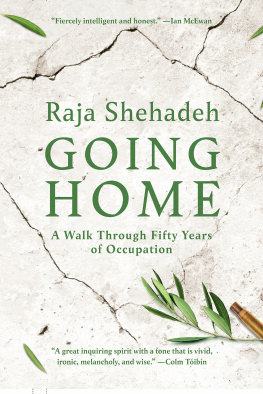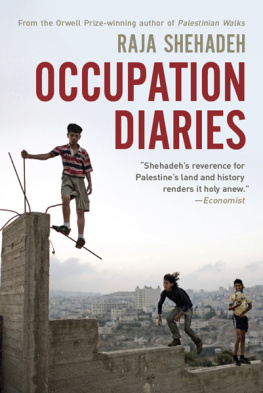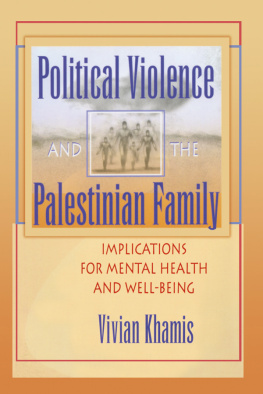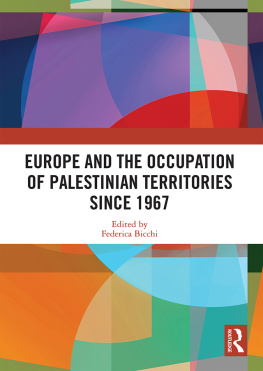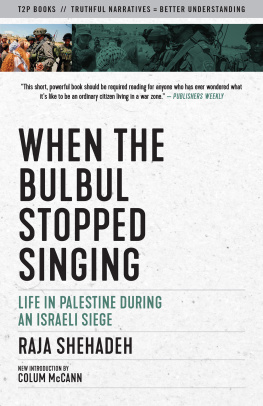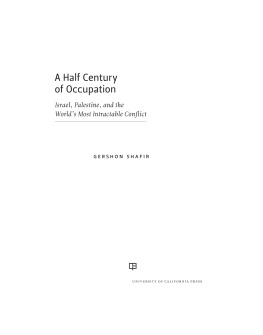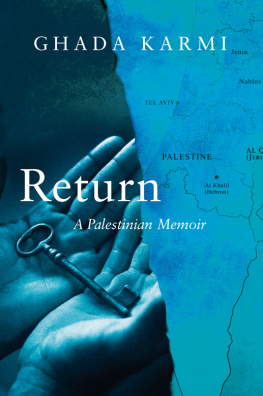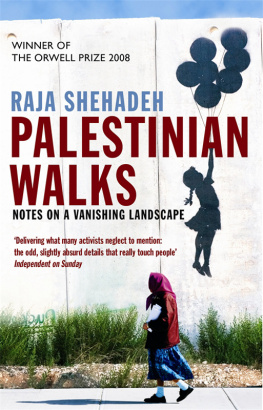
Praise for Raja Shehadeh
Going Home
Going Home cements the authors reputation as the best-known Palestinian writing in English.
Ian Black, The Guardian
Going Home is about searching for the meaning of home when living in a city under occupation. In this book, the bonds that bind Palestinians to the land are exposed. Personal and political, human and geographical histories are beautifully intertwined and preserved.
Claire Kohda Hazelton, The Spectator
Luminously clear-sighted. By turns lyrical, witty and shrewd, Shehadeh is an excellent walking companion.
Matt Rowland Hill, Prospect
An insightful, illuminating book
Paddy Kehoe, RT
Where the Line Is Drawn
No one else writes about Palestinian life under military occupation with such stubborn humanity, melancholy, and fragile grace. One feels the loss in every paragraph Shehadeh writes, but also the inescapable beauty that remains, which both softens and deepens the rage.
Ben Ehrenreich, The Guardian
Writing has allowed Shehadeh to continue crossing into these territories, even as they become increasingly off-limits to him. His books are maps, painstakingly pieced together, of regions lost to senseless division, to bad choices, and to lies.
Ursula Lindsey, The Nation
Remarkable and hopeful a deeply honest and intense memoir.
Gal Beckerman, The New York Times Book Review
Shehadeh describes with courage and grace the internal struggle to remain fair.
The New Yorker
A beautifully impressionistic exploration of shared cultural understanding despite the narrowing of borders.
Kirkus Reviews
Shehadehs incisive, lyrical memoir cuts to the core of a complex cultural identity.
Financial Times
The question of how and if friendships can survive across political divides is a resonant one, and I can think of no one better than Raja Shehadeh to treat it with the wisdom, toughness and humanity that it deserves.
Kamila Shamsie
Raja Shehadehs Where the Line Is Drawn is a courageous and timely meditation on the fragility of friendship in dark times, illuminating how affiliation and lovewithout pretence or concealment, in defiance of occupation and estrangementcan have a profound political power. I hope many people will read and dwell on this unforgettable book.
Madeleine Thien
While I was in Ramallah, I met the Palestinian writer Raja Shehadeh, whose work I did not previously know. His booksincluding Strangers in the House and When the Birds Stopped Singingwere a discovery: he is a great inquiring spirit with a tone that is vivid, ironic, melancholy, and wise.
Colm Tibn
In the dark agony of the Palestine-Israel conflict, Raja Shehadeh offers a rare gift: a lucid, honest, unsparing voice. His humanity and wisdom are invaluable. Where the Line Is Drawn powerfully records many testing aspects of Shehadehs life under Israeli occupation, but at its heart is his long-lived friendship with a fellow intellectual and seeker, Jewish and Israeli. In their bond lies reason for hope. Its a beautiful book.
Claire Messud
The weight of oppression, as Raja Shehadeh calls it, bears down on every page of this delicate, thoughtful memoir of Palestinian life under Israeli occupation.
Fatima Bhutto
Palestinian Walks
A work of passionate polemic, journeying, history, and autobiography, this highly original consideration of the Palestinian-Israeli issue is structured around a series of vigorous, attentive hikes through the occupied territories. Ranks with Sari Nusseibehs memoir, Once Upon a Country.
The New Yorker
Few Palestinians have opened their minds and their hearts with such frankness.
The New York Times
This beautiful book is not just a guide to the Palestinian present; it is an Israeli album of what is taking place in a faraway land: Palestine.
Haaretz
Raja Shehadehs Palestinian Walks provides a rare historical insight into the tragic changes taking place in Palestine.
Jimmy Carter
A thoughtful meditation on Palestine, the land and the peoples who claim it.
Mahmood Mamdani
This constantly surprising book modestly describes walking along certain paths which have touched the lived lives of two millennia. His confessions often encounter a perennial wisdom, and what he is talking about and walking across is one of the nodal points of the worlds present crisis. I strongly suggest you walk with him.
John Berger
This exquisitely written book records a sensitive Palestinian writers love for the landscape of his country, over which he has hiked for many years. It reflects not only the intense beauty of that landscape, but also some of the terrible dangers that threaten it and its occupants.
Rashid Khalidi
GOING HOME
ALSO BY RAJA SHEHADEH
Where the Line Is Drawn
Language of War, Language of Peace
Shifting Sands (ed., with Penny Johnson)
Occupation Diaries
A Rift in Time
Palestinian Walks
When the Birds Stopped Singing
Strangers in the House
GOING HOME
A Walk Through Fifty Years of Occupation
RAJA SHEHADEH

To Ingmar Bergman, whose film Wild Strawberries was an inspiration for this book
Contents
Perhaps home is not a place but simply an irrevocable condition.
James Baldwin, Giovannis Room
A Note to the Reader
Palestinian Walks, published in 2007, is my account of walking in the Palestinian hills and reflecting on my work and life under occupation. The walks described there took place over a twenty-seven-year period. In this book I describe a walk that I took in the course of one day the fiftieth anniversary of the occupation in Ramallah, the city of my birth, trying to come to terms with the political defeats, frustrations and failures that I have witnessed over the years of occupation and resistance, as well as the changes in the city where I live. I also reflect on ageing as I visit and remember the places, people and events in my life. All this, to be able to arrive home and, in the words of Derek Walcott, look in the mirror, greet the face reflected and smile at the others welcome.
One
It must already be eight, I think, as I listen to the national anthem blasting out of St Georges School near my house in Ramallah. I am standing at the bathroom sink, manoeuvring the shaving blade around the deep folds in my face that have formed over the last few years. Next I comb the remaining strands of hair still black left on my balding head with my old brush. My onceabundant hair seems to have made its way south to my nose. There, bursting from my nostrils, I can see plenty that need clipping. How furious my father used to be when I borrowed his scissors to cut my newly emerging moustache and failed to put them back where he could find them. How could I have known then that he needed them for this older mans purpose? As I bring the scissors up to my nose, I examine the brown liver spots on my hands and notice that there are more of them on my temples. I wonder how long theyve been there. Next I study the worryingly persistent red sun patch on my hand. Had I been closer to my father as he was getting on in years, I could have learned about these changes that our bodies go through as they age and been better prepared for what was to come.
Next page
